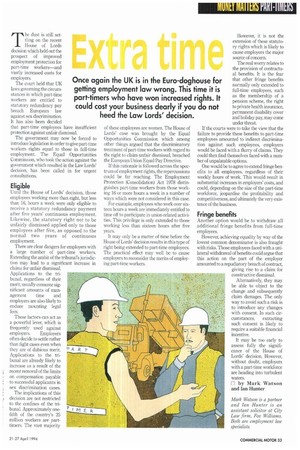T lie dust is still settling on the recent House of
Page 37

If you've noticed an error in this article please click here to report it so we can fix it.
Lords decision which held out the prospect of improved employment protection for part-time workers—and vastly increased costs for employers.
The court held that UK laws governing the circumstances in which part-time workers are entitled to statutory redundancy pay breach European law against sex discrimination, It has also been decided that part-time employees have insufficient protection against unfair dismissal.
The government may now be forced to introduce legislation in order to give part-time workers rights equal to those in full-time employment. The Equal Opportunities Commission, who took the action against the government which resulted in the Law Lords' decision, has been called in for urgent consultations.
Eligible Until the House of Lords' decision, those employees working more than eight, but less than 16, hours a week were only eligible to receive a statutory redundancy payment after five years' continuous employment. Likewise, the statutory right not to be unfairly dismissed applied only to those employees after five, as opposed to the normal two years of continuous employment.
There are clear dangers for employers with a large number of part-time workers. Extending the ambit of the tribunal's jurisdiction may lead to a significant increase in claims for unfair dismissal. Applications to the tribunal, regardless of their merit, usually consume significant amounts of management time and employers are also likely to endure mounting legal fees.
These factors can act as a powerful lever, which is frequently used against employers. Employers often decide to settle rather than fight cases even when they are of dubious merit. Applications to the tribunal are already likely to increase as a result of the recent removal of the limits on compensation payable to successful applicants in sex discrimination cases.
The implications of this decision are not restricted to the confines of the tribunal. Approximately onefifth of the country's 25 million workers are parttimers. The vast majority of these employees are women. The House of Lords' case was brought by the Equal Opportunities Commission which among other things argued that the discriminatory treatment of part-time workers with regard to the right to claim unfair dismissal, breached the European Union Equal Pay Directive.
If this rationale is followed across the spectrum of employment rights, the repercussions could be far reaching. The Employment Protection (Consolidation) Act 1978 distinguishes part-time workers from those working 16 or more hours a week in a number of ways which were not considered in this case.
For example, employees who work over sixteen hours a week are immediately entitled to time off to participate in union-related activities. This privilege is only extended to those working less than sixteen hours after five years.
It may only be a matter of time before the House of Lords' decision results in this type of right being extended to part-time employees. The practical effect may well be to cause employers to reconsider the merits of employing part-time workers. However, it is not the extension of these statutory rights which is likely to cause employers the major source of concern.
The real worry relates to the provision of contractual benefits. It is the fear that other fringe benefits normally only extended to full-time employees, such as the membership of a pension scheme, the right to private health insurance, permanent disability cover and holiday pay, may come under threat.
lithe courts were to take the view that the failure to provide these benefits to part-time employees amounted to indirect discrimination against such employees, employers would be faced with a flurry of claims. They could then find themselves faced with a number of unpalatable options.
One would be to agree to extend fringe benefits to all employees, regardless of their weekly hours of work. This would result in substantial increases in employers' costs, and could, depending on the size of the part-time workforce, jeopardise the profitability and competitiveness, and ultimately the very existence of the business.
Fringe benefits
Another option would be to withdraw all additional fringe benefits from full-time employees.
However, achieving equality by way of the lowest common denominator is also fraught with risks. Those employees faced with a unilateral withdrawal of benefits could argue that this action on the part of the employer amounted to a repudiatory breach of contract, giving rise to a claim for constructive dismissal.
Alternatively, they may be able to object to the change and subsequently claim damages. The only way to avoid such a risk is to introduce any changes with consent. In such circumstances, extracting such consent is likely to require a suitable financial incentive.
It may be too early to assess fully the significance of the House of Lords' decision. However, without doubt, employers with a part-time workforce are heading into turbulent waters.
Fl by Mark Watson and Ian Hunter Mark Watson is a partner and Tan Hunter is an assistant solicitor at City Law firm, Fox Williams. Both are employment law specialists,
























































































